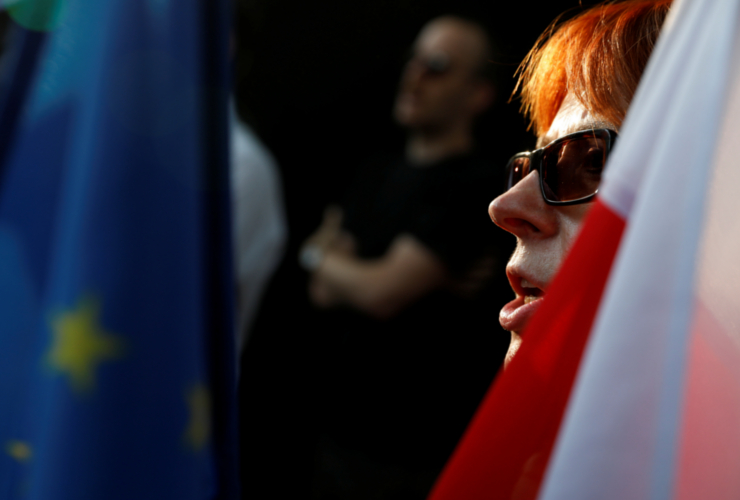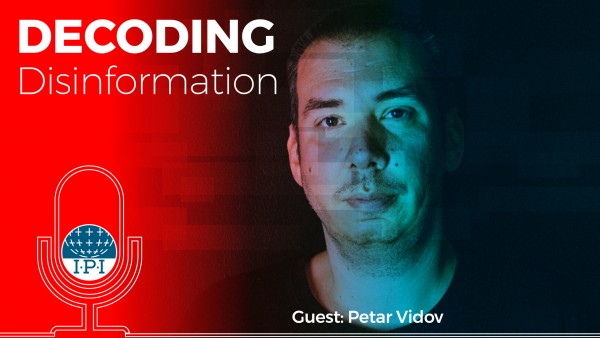Poland ends 2018 with worrying developments in the climate towards journalists. As the country enters election season, leading up to parliamentary elections in autumn 2019, two separate incidents point to rising pressure on the press.
The first incident relates to independent media outlets’ coverage of the scandal at the country’s Financial Supervision Authority (KNF) in November, which led its chairman Marek Chrzanowski to resign amid allegations of corruption.
In their coverage of the scandal and its aftermath, journalists at Gazeta Wyborcza suggested thatthe president of the National Bank of Poland (NBP), Adam Glapiński, Chrzanowski’s mentor, was involved.
In response, at the end of November, the NBP filed a request in court asking for several articles on the NBP and the KNF scandal to be removed from both the print and online editions of Gazeta Wyborcza and the Polish edition Newsweek.
It also demanded a “ban on spreading unfounded statements that violate the personal interests of the National Bank of Poland, suggesting illegal activities by the NBP authorities by insinuating that the President of the National Bank of Poland participated in the so-called KNF scandal”, Gazeta Wyborcza reported.
The court rejected the request on December 10.
Three journalists from Gazeta Wyborcza were also denied entry to a press conference at the NBP following the monthly meeting of its Monetary Policy Council on December 5.
“This reaction is ill-conceived and has had the opposite effect from the intended one. It has led to even greater interest in these articles”, Wojciech Czuchnowski, one of the Gazeta Wyborcza journalists who covered the KNF scandal, and who was denied access, told the International Press Institute (IPI).
“It fits the scheme in which PiS takes over every state institution as ‘its own’ and therefore hostile to opposition from the independent media,” he said, adding that he and his colleagues are under “increasing economic and legal pressure”, including numerous lawsuits.
In a separate incident, Poland’s Internal Security Agency (ABW) entered the home of a cameraman for US-owned private television broadcaster TVN on 23 November. He was called to a hearing, accused of propagating Nazi propaganda (Article 256.1 of the Penal Code).
The cameraman, Piotr Wacowski, had gone undercover to film a report on a Polish neo-Nazi group. The report, which shows the group celebrating Adolf Hitler’s birthday in a forest, was broadcast in January by TVN, which is controlled by U.S. mass media company Discovery, Inc.
“We are treating placing the one who discloses criminal activity on an equal footing with criminals is treated as an attempt to intimidate journalists”, TVN said in a statement published on 24 November.
“The authors of the report acted in accordance with the standards of investigative journalism”, it added.
The TVN incident also prompted a strong reaction from the U.S. ambassador to Poland, Georgette Mosbacher. In a letter to Polish Prime Minister Mateusz Morawiecki circulated in the Polish media on November 27, she expressed her “deep concern” over the government’s treatment of TVN.
“I hope that members of your government will refrain from attacking, let along prosecuting, independent journalists, who articulate public interests and strengthen our societies”, she wrote in the letter dated November 19.
The National Prosecutor’s Office cancelled Wacowski’s hearing on November 25. Nevertheless, Polish journalists worry that these incidents aim to achieve a “chilling effect”. In a statement provided to IPI and other international press freedom groups, the Society of Polish Journalists said that journalists who reported on sensitive issues were being “pursued and treated by the state as potential criminals” in order to “get them to drop critical reporting”.
IPI Deputy Director Scott Griffen echoed that concern.
“Far from being isolated incidents, these recent developments are part of a pattern of growing state intolerance toward critical media, in Poland and in Central Europe more widely”, he said. “While we welcome the fact that these attempted prosecutions were ended, their initiation in the first place is indicative of a serious problem in Poland in terms of the authorities’ understanding and acceptance of the work of journalists. We urge the Polish government to ensure respect for press freedom and free expression as fundamental rights intrinsic to democracy and call on the EU and Poland’s other international partners to remind Poland of these obligations.”



